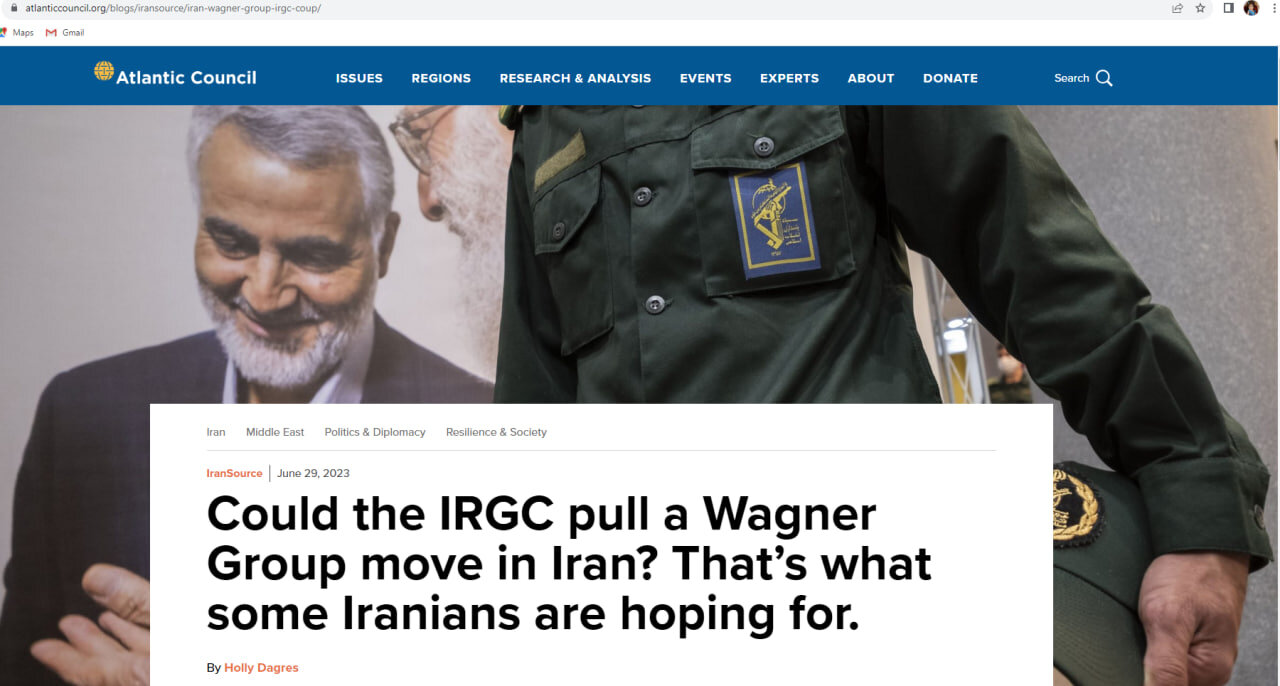The illusion of IRGC coup

TEHRAN- Efforts to weaken Iran have intensified alongside the crucial changes in the region. Western countries cooperate with Iranian opposition groups to limit Iran's sphere of influence in the region and overthrow the Islamic Republic.
However, due to their lack of proper understanding of Iran, these plots by Western parties, sometimes carried out with the cooperation of regional countries, have faced severe failure. One such plot was raising the possibility of a coup by the Islamic Revolution Guard Corps (IRGC).
On June 29, the Atlantic Council, in a report titled “Could the IRGC pull a Wagner Group move in Iran? That’s what some Iranians are hoping for”, made such a wild guess. The report says that some Iranians hope for an IRGC coup to happen. Holly Dagres, an American commentator and the author of the article, and an expert on the Atlantic Council, starts the report by referring to the plan of Reza Pahlavi, a Western-based opposition figure, for the separation of IRGC members from the Islamic Republic and continues to refer to the events that happened in Russia by the Wagner Group, saying: "For years, some Iranians hope that the IRGC will take the helm of the country in the form of a social liberal military dictatorship."
The report explains that the IRGC functions as an arm of the Islamic Republic of Iran and plays a crucial role in protecting it. It is unrealistic to expect the IRGC to act against the interests of the Islamic Republic. As for the absurd notion of a possible coup by the IRGC, several essential points need to be addressed.
IRGC and Wagner are of different nature
When comparing the foundations of the IRGC and Wagner Private Military Company (also known as Wagner Group), it becomes clear that the opposition plan is seriously flawed. The Wagner Group was created for monetary gain, so its soldiers have financial objectives similar to other private armies. However, the IRGC - also known as Sepah Pasdaran - is one of Iran's two military branches and an official organization of the Islamic Republic. It is fundamentally different from private armies.
The IRGC’s unique ideological beliefs distinguish it from official and private armies. Its purpose is to safeguard the Islamic revolution, extending beyond the typical responsibilities of a military force, such as protecting national borders. This goal has been integral since the establishment of the military force.
The IRGC's identity is closely tied to the Islamic Revolution, making a coup impossible. The IRGC and the Islamic Revolution are ideologically intertwined, and opposing the IRGC is seen as opposing the foundation of the revolution itself. This means an IRGC coup would be like staging a coup against itself. Even those who oppose the Islamic Revolution do not consider the possibility of an IRGC coup as a significant scenario.
Coup does not take place within the Islamic Revolution structure
However, some opposition groups are hoping for the possibility of a rebellion by the lower ranks of the IRGC against the Islamic Revolution, which stems from their lack of a proper understanding of Iran’s structure. As mentioned, the IRGC is an ideological military organization. Therefore, the ‘ideological nature,’ as an essence in the body of the IRGC, causes IRGC members to hold a solid commitment to the Islamic Republic and the causes of the Islamic Revolution. As a result, expecting a rebellion by IRGC members against the Islamic Republic is unlikely to occur.
Despite the military protocols worldwide, members of the IRGC do not follow the commander-in-chief solely due to the military structure. Instead, their ideological loyalty to the jurist's authority, velayat-e faqih, has turned obedience into a religious obligation for them. The combination of Sharia responsibility and military hierarchy has established a dual boundary to prevent violation.
Iran has a unique advantage in having two armies, the IRGC and the Islamic Republic of Iran Army (AJA), which prevents any possible coup against the country. In coups worldwide, the military can act against the established government and take control by using their exclusive access to military weapons. However, with two military forces under the command of the General Staff of the Armed Forces of the Islamic Republic of Iran, such events are impossible in Iran.
The impact of miscalculations in dealing with Iran:
Since the victory of the Islamic Revolution, Western countries and regional rivals have made miscalculations about Iran due to lack of a proper understanding of the facts. For foreign parties, the nature and structure of the Islamic Republic have yet to be discovered. So, overthrowing the Islamic Republic of Iran appears unrealistic and delusional to those within Iran.
Many attempts have been made to overthrow the Islamic Republic. And much money has been spent with no success. One of the mistakes made by Western countries was investing in opposition groups, which was evident in last year's unrest in Iran.
Western officials directly intervened in the riots inside Iran because the opposition suggested the possibility of overthrowing or seriously weakening the Islamic Republic as a possible scenario; meanwhile, the opposition was looking for the implementation of delusional scenarios that did not meet the expectations of the Western parties.
The IRGC has been vital in expanding Iran's international power. As a result, attempts to weaken the IRGC by the opposition seem natural. However, the opposition's scenario of weakening the IRGC seems unwise in the eyes of Western governments.
